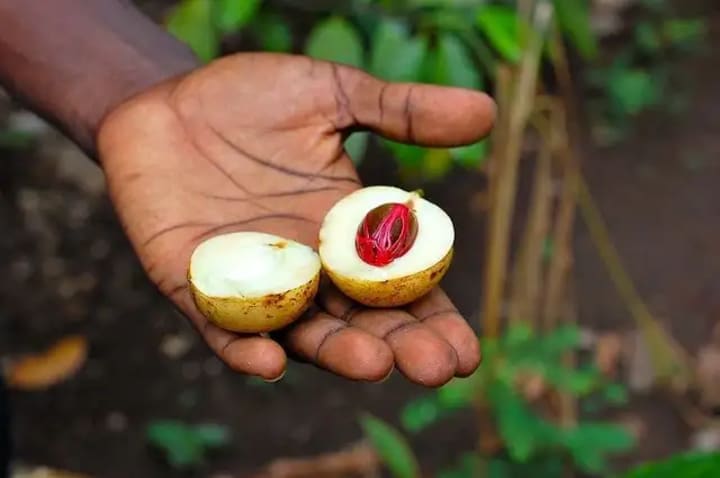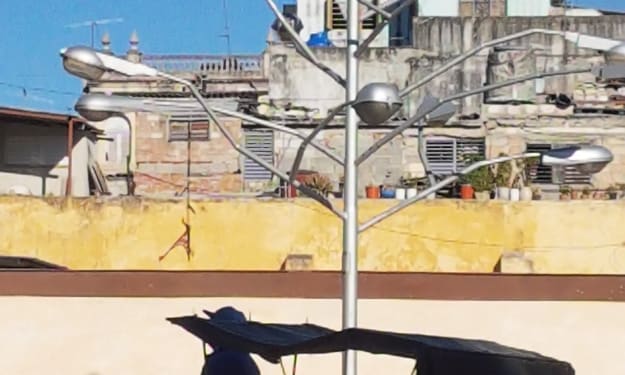Nathaniel's Nutmeg
People were nuts over nutmeg and it started a war between England and Holland - and even led to a British invasion

For the last few weeks we’ve been in the Spice Islands (aka the Moluccas or Maluku Islands) after sailing about 300 miles up from Darwin, North Australia.
I didn’t ever expect to visit the Spice Islands, but Covid mandated a two year lockdown in New Zealand on my boat, during my slow round-the-world voyage. That wasn’t too bad considering how the disease messed up so many lives and plans.
Then after New Zealand we had to leave Australia when our visas expired — we were running late anyway after a long voyage up and around the top of Australia. By then it was too late in the year for the Indian Ocean crossing to Cape Town as the southern hemisphere cyclone season (November to May) was looming.
So, sail north to Indonesia became the plan.
And here we are. The Spice Islands.

We formally entered Indonesia in Saumlaki, on the island of Yamdena (in the Tanimbar group) and then moved on to Tual on in the Kei group, about 170 miles further to the northeast.
I’d first read about the Spice Islands many years ago in the book ‘Nathaniel’s Nutmeg’ by Giles Milton (no affiliation). The book is a riveting story of business, duplicity and greed. And of course, sailing ships.
When I finished the book I considered making a voyage to retrace the route of the old spice ships. At the time my boat was in England. I examined the practicalities and didn’t fancy dealing with the southwest monsoon. So I dismissed the notion and the Spice Islands did not figure in my grand world-girdling plans.
Isn’t life strange?
The Spice Islands
The Spice Islands lie in the Regency of Maluku, an administrative region of Indonesia.
Indonesia, with 17,500 islands and 275 million people is the largest archipelagic country in the world — and the largest Muslim country by population.
The Islands have recently been subject to political re-organisation after conflict between the Christian and Muslim populations.
Since we arrived the First Mate has been complaining about being woken up by the muezzin at 4 am when the call to prayer starts with three mosques in competition. I’m half deaf and so it doesn’t bother me.
Around 1790 -1810 the Spice Islands were the cause of a war between England and Holland and led to a British invasion. All because of spices. Specifically nutmeg, mace and cloves.
The spices
Nutmeg, Mace and Cloves

Without doubt you will have heard of these spices and probably used them in cookery, maybe you even know the term nutmeg in connection with football (aka soccer).
Cloves are a great addition to a curry, nutmeg to a rice pudding or mashed potatoes, but mace? I don’t think I’ve ever used it.
Mace is the protective coating (‘aril’) which encases the actual nutmeg seed. It can be used as blade mace (the ‘leaf’) or ground mace. It is a little less sweet and sharper to the taste than nutmeg and can be used in sweet and savoury dishes.

Oil of cloves is of course used as a topical analgesic for toothache, less so these days with modern painkillers. As I write about it I wonder what it must be like in copious quantities and what the active ingredient is. I currently have a problem with a molar — the root canal filling came out and I’ve plugged it with dental epoxy. It’s manageable, so far. Such is life on a boat.
Here’s what Wikipedia says:
Particularly in South Korea and India, eugenol, a phytochemical extracted from clove oil, is used to relieve toothache. Applied to a cavity in a decayed tooth or tooth socket remaining after extraction, eugenol or clove oil may relieve toothache temporarily. In the United States, the FDA considers eugenol ineffective for treating dental pain, and has downgraded clove oil as an analgesic due to insufficient evidence to rate its effectiveness.
I do remember when I was a boy being given it by my mother to relieve toothache, but these days I prefer cloves in mulled wine or curry.
The Spice route

The 17th century sailing route from northwest Europe to the Spice Islands led first to Las Palmas in the Canary Islands. Then on to Rio de Janeiro or Salvador in Brazil and then Cape Town, stopping for fresh water and provisions at these ports.
From Cape Town the voyage became more difficult, as crossing the Indian Ocean from west to east is not easy unless you head south to the Roaring Forties to use the strong westerly winds. But that is much too long a way to go as it means sailing south around Australia. So the preferred route leads to the area of lighter winds in the North Indian Ocean and uses the southwest monsoon to give favourable winds. Timing the seasons correctly is important — just as we did not…
The Spice wars
The Invasion of the Spice Islands sounds like a low-budget sci-fi film, but actually took place in 1810:
The invasion was a military invasion by British forces that took place between February to August 1810 on and around the Dutch owned Maluku Islands (or Moluccas) also known as the Spice Islands in the Dutch East Indies during the Napoleonic wars.
By 1810 the Kingdom of Holland was a vassal of Napoleonic France and Great Britain along with the East India Company sought to control the rich Dutch spice islands in the East Indies.
In a campaign that lasted seven months British forces took all of the islands in the region.
The reason for war
The precious spices — nutmeg, mace and cloves — were immensely valuable commodities in the seventeenth century.
The Spice Islands were the only place in the world where these spices grew. And people were crazy about them. Investors funded English and Dutch ships to sail out to the islands and load up with the spices. A two to three year return voyage could make the investors into millionaires.
Prized for their medicinal properties, as well as their capacity to flavor food, these spices could be sold for enormous markups in Europe. The bulk of the world’s cloves came from the island of Ambon, also known as Amboyna, and its surrounding territories, while the Banda Islands were the world’s richest producer of nutmeg.
But just as Captain James Cook transported breadfruit from the Pacific to be grown in the Caribbean (and provide cheap food for the slaves), so the Spice Islands monopoly was lost as the nutmeg and cloves trees had been uprooted by the East India Company and moved to other parts of the British Empire before the Islands were handed back to the Dutch by the Anglo-Dutch Treaty of 1814.
And another glorious chapter in European colonial history was closed - at least until the Dutch East Indies sought independence from Holland.
Next…
After Tual we’ll head for Irian Jaya (New Guinea) and the Rajah Ampat islands, before sailing back to Ambon (Amboyna), which was the main spice trading centre in the old days.
The warriors of Tanimbar are long dead, but there are still rumours of head hunters in New Guinea…
===
Previously published on Medium. Canonical link.
About the Creator
James Marinero
I live on a boat and write as I sail slowly around the world. Follow me for a varied story diet: true stories, humor, tech, AI, travel, geopolitics and more. I also write techno thrillers, with six to my name. More of my stories on Medium






Comments
There are no comments for this story
Be the first to respond and start the conversation.